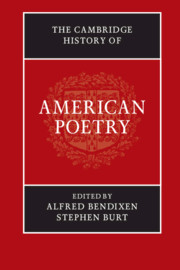Book contents
- The Cambridge History of American Poetry
- The Cambridge History of American Poetry
- Copyright page
- Contents
- Notes on Contributors
- Acknowledgments
- Introduction
- Part I Beginnings: Poetry before 1800
- Chapter 1 Remembering Muskrat
- Chapter 2 Rhyming Empires
- Chapter 3 The World, the Flesh, and God in Puritan Poetry
- Chapter 4 Confronting Death
- Chapter 5 The Emergence of a Southern Tradition
- Chapter 6 Poetry in the Time of Revolution
- Part II A New Nation: Poetry from 1800 to 1900
- Part III Forms of Modernism, 1900–1950
- Part IV Beyond Modernism: American Poetry, 1950–2000
- Selected Bibliographies
- Index
Chapter 1 - Remembering Muskrat
Native Poetics and the American Indian Oral Tradition
from Part I - Beginnings: Poetry before 1800
Published online by Cambridge University Press: 05 December 2014
- The Cambridge History of American Poetry
- The Cambridge History of American Poetry
- Copyright page
- Contents
- Notes on Contributors
- Acknowledgments
- Introduction
- Part I Beginnings: Poetry before 1800
- Chapter 1 Remembering Muskrat
- Chapter 2 Rhyming Empires
- Chapter 3 The World, the Flesh, and God in Puritan Poetry
- Chapter 4 Confronting Death
- Chapter 5 The Emergence of a Southern Tradition
- Chapter 6 Poetry in the Time of Revolution
- Part II A New Nation: Poetry from 1800 to 1900
- Part III Forms of Modernism, 1900–1950
- Part IV Beyond Modernism: American Poetry, 1950–2000
- Selected Bibliographies
- Index
Summary
- Type
- Chapter
- Information
- The Cambridge History of American Poetry , pp. 15 - 42Publisher: Cambridge University PressPrint publication year: 2014

